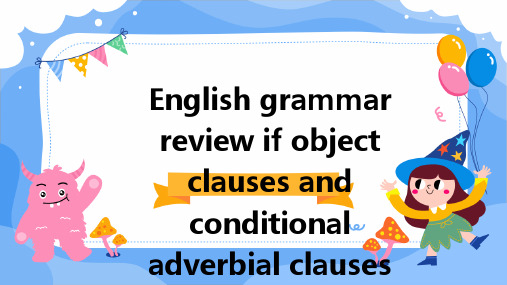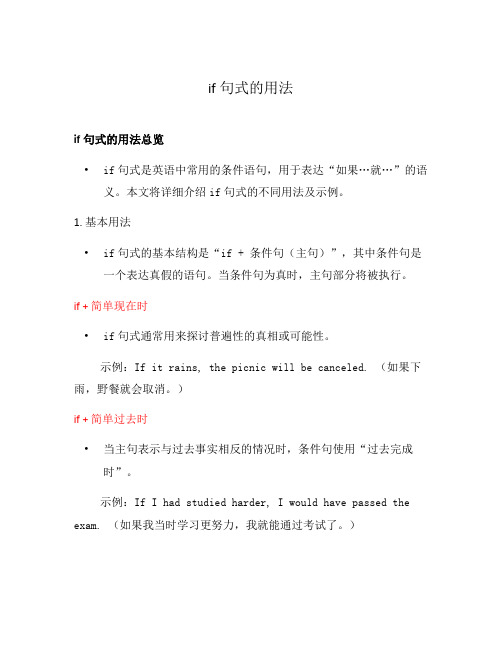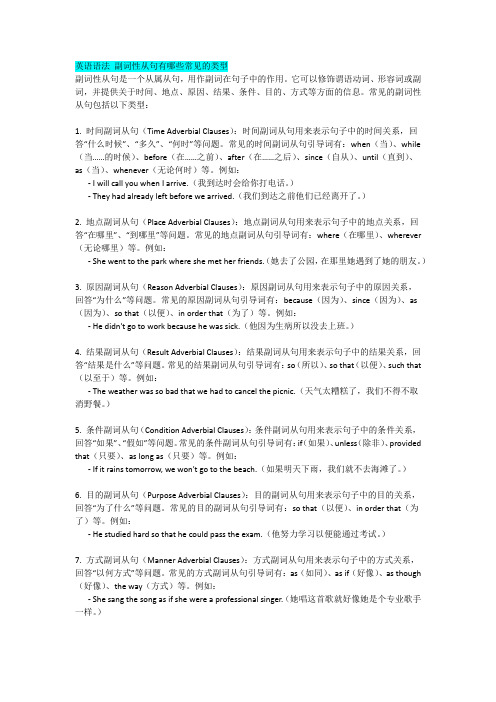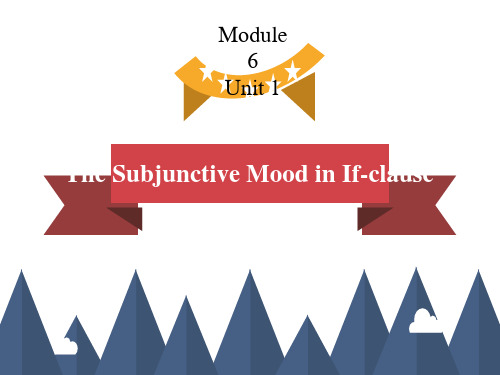高中英语语法if条件句If_Clauses
英语语法复习if宾语从句和条件状语从句课件

The Composition of If Object Clause
Subject
The subject of an if object clause can be a noun, pronoun, or any other part of speech that can function as the subject of a verb
The Tense and Word Order of If Object Clause
要点一
Tense
要点二
Word order
The tense of the verb in an if object class depends on the tense of the main clause If the main clause is in the present tense, the if object clause will be usable in the present tense as well If the main clause is in the past tense, the if object clause will be in the past tense
Verb
The verb in an if object clause is usually in the simple present tense or simple past tense, depending on the tense of the main clause
Other elements
used in the if clause, and the would+base form of the verb is used in the main clause • The word order in a conditional advisory clause is typically: subordering connection+subject+verb
if句式的用法

if句式的用法if句式的用法总览•if句式是英语中常用的条件语句,用于表达“如果…就…”的语义。
本文将详细介绍if句式的不同用法及示例。
1. 基本用法•if句式的基本结构是“if + 条件句(主句)”,其中条件句是一个表达真假的语句。
当条件句为真时,主句部分将被执行。
if + 简单现在时•if句式通常用来探讨普遍性的真相或可能性。
示例:If it rains, the picnic will be canceled. (如果下雨,野餐就会取消。
)if + 简单过去时•当主句表示与过去事实相反的情况时,条件句使用“过去完成时”。
示例:If I had studied harder, I would have passed the exam. (如果我当时学习更努力,我就能通过考试了。
)2. 引导if句式的词•if句式可以由多种引导词来引导,区别在于表达的情境和意义。
unless•unless相当于if…not,表示“除非”。
示例:Unless you hurry up, we will miss the train. (除非你快点,否则我们会错过火车。
)in case•in case 表示“以防万一”,它引导的if句式表示提前采取的行动。
示例:Take an umbrella in case it rains. (带把伞以防下雨。
)provided/providing (that)•provided/providing (that) 表示“只要”,引导的if句式多用在正式场合。
示例:You can go in, provided that you show your ID. (只要你出示身份证,你可以进去。
)3. if句式与虚拟语气•if句式常与虚拟语气搭配使用,表示假设、愿望、建议等感情态度。
if + 过去完成时 + would + 动词原形•if句式中的过去完成时表示与过去事实相反的情况,would表示对未来的推测或假设。
if 英语语法

"If" 是一个连词,在英语语法中用来引导条件语句。
它可以在句子中引入一个条件状语从句(conditional clause),表示假设或条件,并且与主句(main clause)构成条件句(conditional sentence)。
条件句可分为三类:1. 第一类条件句:表示假设是真实的、可能会发生的情况,形式为:If + 现在时态,主句+ 现在时态(If + 主语+ 现在时态,主语+ 现在时态)例如:- If I have time, I will go to the gym tonight.(如果我有时间,我今晚会去健身房。
)即:假如我现在有时间,那么今晚我就会去健身房。
2. 第二类条件句:表示假设是不真实的、不可能会发生的情况,形式为:If + 过去时态,主句+ 过去完成时态(If + 主语+ 过去时态,主语+ 过去完成时态)例如:- If I had studied harder, I would have passed the exam.(如果我学得更用心些,我就能通过这次考试了。
)即:实际上我没通过考试,而且我没学得用心,但是如果我学得更用心,我就可以通过考试。
3. 第三类条件句:表示假设即使是真实的,也不会对结果产生影响的情况,形式为:If + 过去完成时态,主句+ 过去完成时态(If + 主语+ 过去完成时态,主语+ 过去完成时态)例如:- If I had taken that job, I would have moved to California.(如果我接受了那份工作,我就会搬到加利福尼亚去了。
)即:我最后没有接受那份工作,所以我也没有搬去加利福尼亚; 但即使我接受了那份工作,我也会搬到加利福尼亚。
英语语法 副词性从句有哪些常见的类型

英语语法副词性从句有哪些常见的类型副词性从句是一个从属从句,用作副词在句子中的作用。
它可以修饰谓语动词、形容词或副词,并提供关于时间、地点、原因、结果、条件、目的、方式等方面的信息。
常见的副词性从句包括以下类型:1. 时间副词从句(Time Adverbial Clauses):时间副词从句用来表示句子中的时间关系,回答“什么时候”、“多久”、“何时”等问题。
常见的时间副词从句引导词有:when(当)、while (当……的时候)、before(在……之前)、after(在……之后)、since(自从)、until(直到)、as(当)、whenever(无论何时)等。
例如:- I will call you when I arrive.(我到达时会给你打电话。
)- They had already left before we arrived.(我们到达之前他们已经离开了。
)2. 地点副词从句(Place Adverbial Clauses):地点副词从句用来表示句子中的地点关系,回答“在哪里”、“到哪里”等问题。
常见的地点副词从句引导词有:where(在哪里)、wherever (无论哪里)等。
例如:- She went to the park where she met her friends.(她去了公园,在那里她遇到了她的朋友。
)3. 原因副词从句(Reason Adverbial Clauses):原因副词从句用来表示句子中的原因关系,回答“为什么”等问题。
常见的原因副词从句引导词有:because(因为)、since(因为)、as (因为)、so that(以便)、in order that(为了)等。
例如:- He didn't go to work because he was sick.(他因为生病所以没去上班。
)4. 结果副词从句(Result Adverbial Clauses):结果副词从句用来表示句子中的结果关系,回答“结果是什么”等问题。
条件状语从句英语语法大全

条件状语从句英语语法大全条件状语从句条件状语从句是由引导词if或unless引导的从句。
例如:1.如果明天不下雨,我们就去远足。
2.如果你努力研究,就会取得好成绩。
3.除非他也去,否则我不会去参加聚会。
4.如果你不马上走,你将会迟到。
(如果你不走,你会迟到。
)在英语中,条件是指某一件事情实现之后(状语从句中的动作),其它事情(主句中的动作)才能发生,通常译作“假如”。
需要注意的是,在含有条件状语从句的复合句中,表示将来时态时,主句要用一般将来时态,从句要用一般现在时、祈使句或情态动词,即主将从现原则。
主将从现并不是指将来时,而是表示将来的含义,与if后的从句相呼应。
条件状语从句类型if是条件状语从句最常用的连词,表示在某种条件下某事很可能发生。
例如:1.如果你请他帮忙,他会帮你的。
2.如果你考试不及格,你会让他失望。
if引导的条件状语从句既可以将从句放前面,也可以将从句放后面。
例如:“如果天下雨,我们就不玩了”可以转化为“We will。
playing if it rains.”此外,if从句还可以表示不可实现的条件或根本不存在的条件,即一种虚拟的条件或假设,从句多用一般过去时或过去完成时。
例如:表示可能实现的条件,主句用一般将来时,从句用一般现在时。
例如:If it rains tomorrow。
we will stay at home。
如果明天下雨,我们会待在家里。
非真实条件句则表示假设的情况,分为虚拟条件句和虚拟结果句。
虚拟条件句表示与现实相反的情况,主句用would/could/might+动词原形,从句用过去时或过去完成时。
例如:If I had more time。
I would travel around the world。
如果我有更多时间,我会周游世界。
虚拟结果句则表示与现实相反的结果,主句用过去时,从句用would/could/might+动词原形。
例如:If I had studied harder。
高中英语语法The Subjunctive Mood in If-clause虚拟语气-结合名著和日常生活讲解,非常易懂

If you ________ (be) me, how would you wouldn’t have use your own eyes? If you had known you
Appreciate a poem
“If time…”
IF TIME…
appreciate If time smiled, would she _______________ (appreciate) our cherishing her; If time talked ________ (talk), she would tell us to cried hurry up; If time ________ (cry), she would cry for us wasting our lives. would make would get So what had do I do? If I had magic, I ___________ (make) my days flow slowly. would spend had If I ______ (have) magic, I __________ (get)
million dollars now, I would travel around the world . post If I sent cards to my friends, more people would become my friends.
1
2
4
3
around the world, I would send post cards to my friends. If more people became my friends, I …
if的条件句的三种用法

千里之行,始于足下。
if的条件句的三种用法条件句在英语中是非经常见的一种句型,用于表达假设、可能性和条件关系。
if(假如)是条件句的引导词,它可以有不同的用法和用途。
下面将具体介绍if条件句的三种常见用法。
1. 条件虚拟语气条件虚拟语气用于表示假设、与事实相反的状况或不行能的状况。
它包括三种类型:与现在事实相反、与过去事实相反和与将来事实相反。
与现在事实相反:这种类型的条件句用于描述与现实状况相反或与过去和现在的条件不全都的状况。
它的结构是:“if + 过去完成时,主语 + would/could/might + 动词原形”。
例如:- If I had studied harder, I would have passed the exam.(假如我学习更努力点,我就会通过考试了。
)- If she had told me earlier, I could have helped her.(假如她早点告知我,我原来可以挂念她的。
)与过去事实相反:这种类型的条件句用于描述与过去事实相反的状况。
它的结构是:“if + 过去完成时,主语 + would/could/might + have + 过去分词”。
例如:- If I had known he was sick, I would have visited him.(假如我知道他病了,我原来会去探望他的。
)第1页/共3页锲而不舍,金石可镂。
- If the weather had been better, we might have gone to the beach.(假如天气好些的话,我们或许会去海滩的。
)与将来事实相反:这种类型的条件句用于描述与将来事实相反的状况。
它的结构是:“if + 过去完成时,主语 + would/could/might + 动词原形”。
例如:- If I had more money, I would travel around the world.(假如我有更多的钱,我就会周游世界。
英语语法从句类型总结

导语:英语学习有没有规律?学到何种程度才能算学好?英语学习需要哪些系统要素?⽆忧考整理了英语学习的⼀些资料,欢迎阅读。
⼀、定语从句 在复合句中,修饰名词或代词的从句叫定语从句,被修饰的名词或代词叫先⾏词,引导定语从句的有关系代词who,whom,whose,which,that等和关系副词where,when,why等,关系代词和关系副词在定语从句中担任句⼦成份。
1.由who引导的定语从句中,who⽤作主语,如:Thisistheboywhooftenhelpsme. 2.由whom引导的定语从句中,whom⽤作宾语,如:Themanwhomyouarewaitingforhasgonehome. 3.由whose引导的定语从句中,whose⽤作定语,如:Doyouknowthegirlwhoseskirtiswhite? 4.由which引导的定语从句中,which⽤作主语或谓语动词的宾语或介词的宾语,如: 5.由that引导的定语从句中,that可以指⼈或物,在从句中作主语或谓语动词的宾语,但不能放在介词后⾯作介词宾语,如: ThebookthatIboughtyesterdaywaswrittenbyLuXun. 6.由when,where,why引导的定语从句,如: Idon'tknowthereasonwhyhewaslate. Thisistheplacewherewehavelivedfor5years. I'llneverforgetthedaywhenImetMrLiforthefirsttime. 注意:先⾏词是表⽰地点时,如果从句的谓语动词是及物的,就⽤that(which),如果从句的谓语动词是不及物的,就⽤where引导。
ThisisthehouseWhich/thathehaslivedinfor15years.(Wherehehaslivedfor15year.) 7.限制性定语从句和⾮限制性定语从句 (1)限制性定语从句是句中不可缺少的组成部分,主句和从句之间不⽤逗号分开。
- 1、下载文档前请自行甄别文档内容的完整性,平台不提供额外的编辑、内容补充、找答案等附加服务。
- 2、"仅部分预览"的文档,不可在线预览部分如存在完整性等问题,可反馈申请退款(可完整预览的文档不适用该条件!)。
- 3、如文档侵犯您的权益,请联系客服反馈,我们会尽快为您处理(人工客服工作时间:9:00-18:30)。
If you played a musical instrument, you could join the local bend.
If she tried Japanese food, she might find that she likes it.
If I should win the race, I should thank the coach for his help.
Go/You can go to bed if you feel tired.
TYPE ONE
In the first conditional, we describe a real possibility. We talk about facts that, given certain conditions, probably or possibly will take place in the future.
• The second conditional is also used when propose a different situation to the present reality.
If you worked harder, your grades would be much better. (situation that is different to
If you spend too much time in the sun, you may get sunburnt. (it isn’t certain)
TYPE TWO
• When we assume a condition to be improbable or imaginary and that we don’t expect to happen but is however, theoretically possible, we can use the second conditional.
If you would kindly tell the manager, I would really be grateful.
• The use of should in if clauses makes the hypothesis more impropable.
If it should hail, the harvesonger if you travel north. If you press this key, the display lights up.
• give advice. In this case, the present form of imperative or modal (can or may) is used in the main clause
If you had asked me, I would have helped you. If I had found her address, I would have sent her an invitation.
(Sometime in the past, I wanted to send an invitation to a friend. I didn't find her address, however. So in the end I didn't send her an invitation.)
He would make a very good career if he was/were a little more ambitious.
• The expressions If i were you/him/her.... is used to give advice and warnings.
The modals would, should or could are often found in if clauses.
• Would is used in if clauses to express a request in a polite and formal way, or even to express willingness to do something.
Main clause: would/’d/wouldn’t + base form I would drive to work. I would send her an invitation. I wouldn’t stay here.
• Note how the second conditional is structured in the question form:
In this case, the verb tenses are usually: If clause: if + present simple If it doesn’t rain, If I find her address, Main clause: will/’ll/won’t + base form we’ll have a barbecue in the garden tomorrow. I will send her an invitation.
the present reality: at the moment you aren’t working hard enough)
The structure of the second conditional is:
If clause: if + past simple If I had my own car, If I found her address, If I had a lot of money,
If clause (condition)
If you book your holiday in advance,
Main clause (consequence)
you get a discount.
Depending on the level of probability (certain, probable, possible or purely theoretical conditions) different tenses are used in two parts of the conditional. There are four types of conditional: type zero, one, two and three, which we are going to explain.
If clause: if + present simple
If you visit London,
Main clause: present simple
go on the London Eye.
The zero conditional is used to:
• express general truths, scientific and mathematical laws, technical procedures, instructions.
IF Clauses
To express a consequence depending on a condition, we use the conditional, which consists of an IF clause. The IF clause can precede or follow the main clause. When the IF clause comes first, a comma is placed between the two clauses.
If I were you, I’d talk to her.
In a main clauses, as an alternative to would, other modals can be found such as: could to express ability or possibility, might to express uncertainty and should to express a piece of advice.
• The use of could in if clauses indicates the ability and possibility.
If you could dance, you would have a lot more fun.
TYPE THREE
When we propose an impossible condition, because it refers to the past and it is therefore no longer possible, we use the third conditional.
TYPE ZERO
In the IF clause of the zero conditional, we describe a consequence that takes place regularly and with certainty. If clause: if + present simple If I drink coffee in the evening, If clause: if + present simple If unemployment is rising, Main clause: present simple I can’t go the sleep. Main clause: present simple people tend to stay in their present jobs.
If you come to my house, I’ll show you my paintings.
